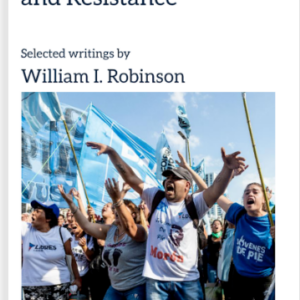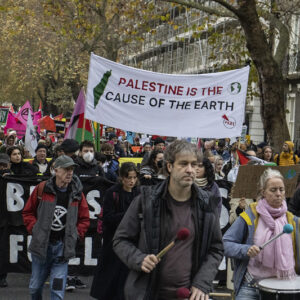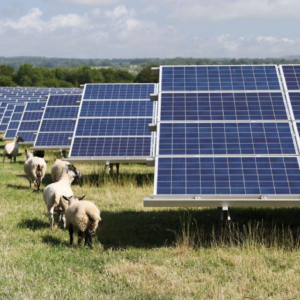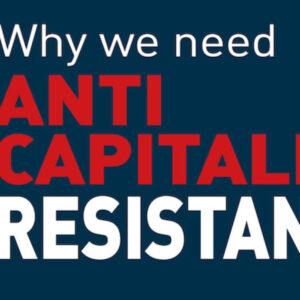Hugo Blanco, who died on Sunday 25th June, was an almost mythical Peruvian revolutionary leader. I had the pleasure of working with him and it is fair to say all of us who met him found not a cold legend but a warm and beautiful human being.
He led a peasant uprising in the 1960s, which while successful in achieving land rights, saw him spend many years in prison, often in very difficult conditions and for much of the time on death row. He was at the time a leading member of the Fourth International and maintained warm contact with the FI up until his death. In recent decades, inspired by the Zapatistas and other indigenous movements, he published the newspaper Lucha Indigena (‘Indigenous Fight’).
There are three things, at least, which are important about Hugo Blanco. Firstly, he was a continuous active revolutionary militant from his student days right up until final illness. Secondly, he took an open comradely approach to this militancy, working with others and being flexible as to appropriate tactics. Thirdly, he was a pioneering ecosocialist, promoting an ecological approach to revolutionary activism before many of us were conscious of this element.
There is so much to say about his long life, it is difficult to know where to start perhaps. However, a key moment for Hugo was hearing about an indigenous person being physically branded with a hot iron. Though only a school student at the time, hearing of this started him on a lifelong path of working against oppression, particularly the oppression of indigenous peoples.
He became at Trotskyist as a student in Argentina in the 1950s. He, like many other Latin Americans was appalled by the coup led by the CIA in Guatemala in 1954. Attending a demonstration, he heard different speakers from different political currents, he was most impressed by the speaker who called for the masses in Guatemala to be armed. Learning that the speaker was a Trotskyist, Hugo decided he was a Trotskyist too.
He soon became a committed party member and worked at a various factories before moving back to Peru to organise the masses. He was held in a police cell overnight in Cusco for organising workers. He shared his cell with three individuals from the La Convención region, bordering the Peruvian Amazon. They asked him to move to their region and help with their struggle for land rights, a struggle that accelerated with landowners murdering the peasants occupying land. In response, Hugo organised armed self-defence groups, with the conflict leading to both victory and imprisonment.
Released in 1970 by the new Peruvian military government, Hugo became active once again supporting trade union disputes and other struggles. He was exiled. Variously he spent time in Mexico, Argentina and Chile. He was in Chile during the coup against Allende’s socialist government, narrowly escaping death as he was rescued by the Swedish Embassy. His beard was shaved off, he was put in a suit and spirited out under the name of Hans Bloom. His daughter Carmen went to school with daughter of the Swedish Ambassador; but for this he might well have been killed.
He lived for a time in Sweden, returned to Peru and was involved in many more struggles, indeed he was once a candidate for the Presidency and spent some time as a Senator. As Senator he was particularly engaged with environmental protection. Threatened with death by both the state security services and Shining Path, he was exiled, once again, this time back to Mexico.
He was least enthusiastic about his participation in electoral politics and in the last twenty years has been committed to grassroots militancy rather than traditional Leninism. There is, however, continuity in his approach, which has always focused on mass democratic struggles and decision making ‘“I have always respected the indigenous characteristic that it is the community that is responsible, not the individual. Even when we took up arms, it was the masses who decided to defend themselves”. (Hugo Blanco, the Peruvian ecosocialist – International Viewpoint – online socialist magazine)
Equally his ecological struggles were rooted though in his life-long commitment to land rights. Lucha Indigena has supported many, many workers’, indigenous and ecological struggles not just in Peru but across the world. Hugo has toured many countries in support of ecosocialists’ campaigns, and in 2019 met Greta Thunberg in Stockholm. Hugo argued that environmental politics is rooted in the struggles of the oppressed, noting
There are in Peru a very large number of people who are environmentalists. Of course, if I tell such people, you are ecologists, they might reply, “ecologist your mother” or words to that effect. Let us see, however. Isn’t the village of Bambamarca truly environmentalist, which has time and again fought valiantly against the pollution of its water from mining? Are not the town of Ilo and the surrounding villages which are being polluted by the Southern Peru Copper Corporation truly environmentalist? Is not the village of Tambo Grande in Piura environmentalist when it rises like a closed fist and is ready to die in order to prevent strip-mining in its valley?
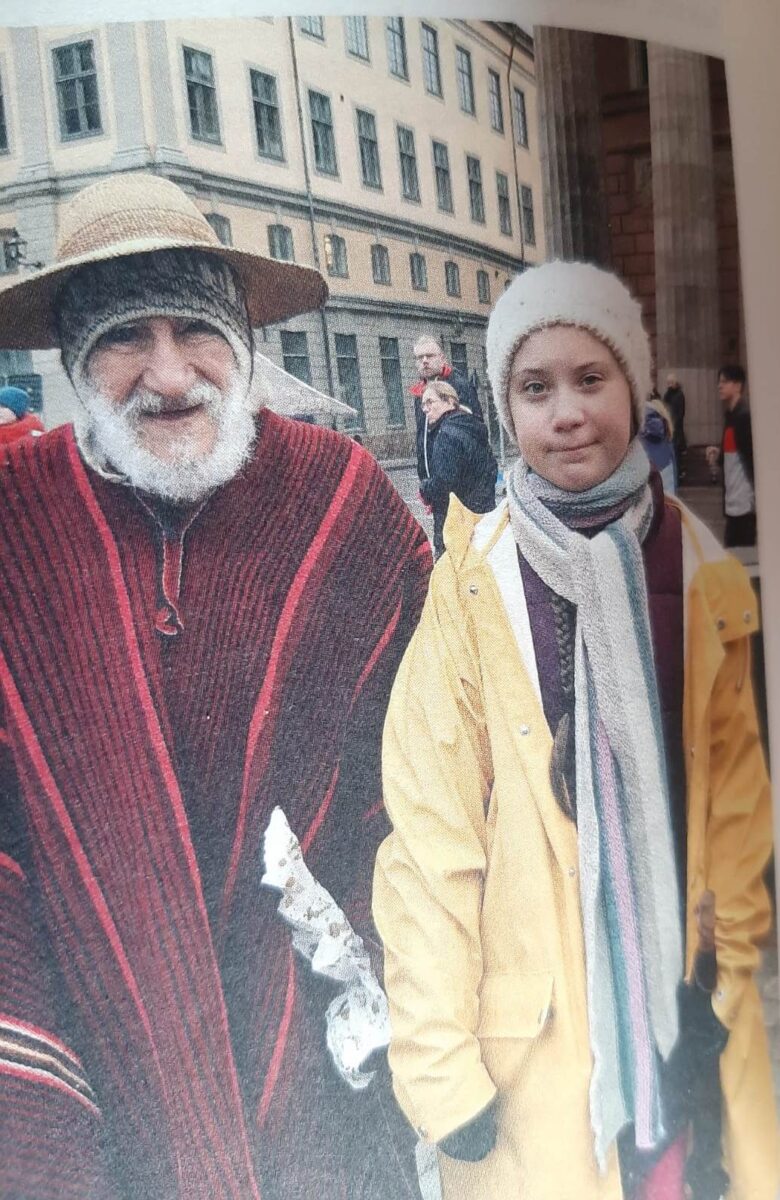
It is impossible in a thousand words or even five thousand to properly honour and describe his various political campaigns or indeed his numerous often near miraculous escapes from death. However perhaps the best epitaph and summary comes from another Latin American revolutionary.
In Algiers in 1963 Che Guevara noted:
Hugo Blanco is the head of one of the guerrilla movements in Peru. He struggled stubbornly but the repression was strong. I don’t know what his tactics of struggle were, but his fall does not signify the end of the movement. It is only a man that has fallen, but the movement continues. One time, when we were preparing to make our landing from the Granma, and when there was great risk that all of us would be killed, Fidel said: “What is more important than us is the example we set.” It’s the same thing. Hugo Blanco has set an example’
And Hugo kept setting the example for decades after, the best way to honour his life is to continue his legacy of indigenous solidarity, ecosocialism and practical, focused revolutionary commitment.
There is a film about Hugo released in 2020, Río Profundo, and many, many interviews from him that can be read. He was a huge inspiration to all of us who met him.
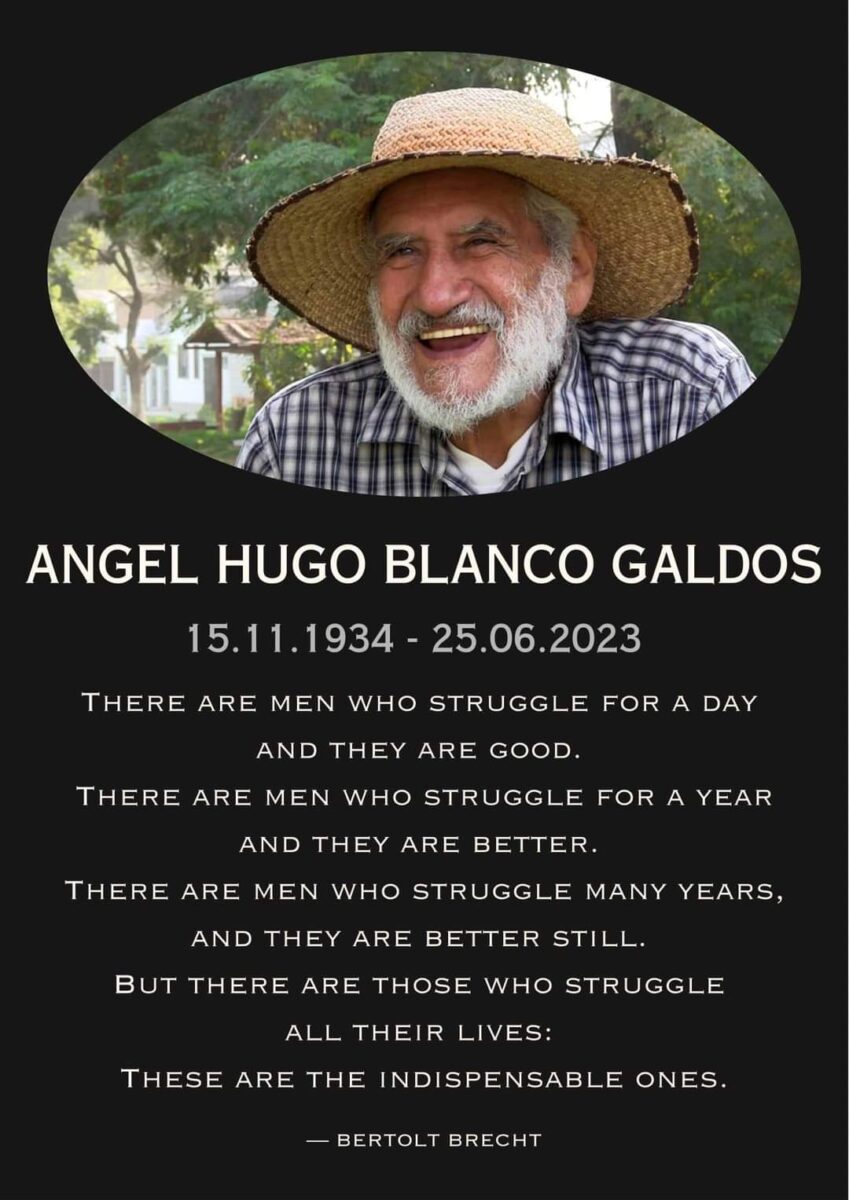
Derek Wall wrote Hugo Blanco: A Revolutionary For Life published by Merlin/Resistance books in 2018
Resistance Books and Merlin also published We the Indians:– The indigenous peoples of Peru and the struggle for land in the same year.
Art (50) Book Review (111) Books (113) Capitalism (65) China (77) Climate Emergency (97) Conservative Government (90) Conservative Party (45) COVID-19 (44) Economics (37) EcoSocialism (51) Elections (82) Europe (44) Fascism (54) Film (48) Film Review (61) France (68) Gaza (59) Imperialism (97) Israel (117) Italy (44) Keir Starmer (51) Labour Party (110) Long Read (42) Marxism (47) Palestine (141) pandemic (78) Protest (146) Russia (325) Solidarity (126) Statement (46) Trade Unionism (133) Ukraine (327) United States of America (124) War (360)
Latest Articles
- War, Global Capitalism and Resistance: Selected writings by William I. RobinsonABOUT THE AUTHOR William I. Robinson is Distinguished Professor of Sociology, Global Studies, and Latin American Studies at the University of California at Santa Barbara. Among his many award-winning books are Can Global Capitalism Endure?(2022); Global Civil War: Repression and Rebellion in the Post Pandemic World (2022); The Global Police State (2020); Into the Tempest: Essays on the New Global … Read more
- Climate protests bring together the environment and PalestineProtests happened around the world on 16 November during the COP29 climate conference in Azerbaijan reports Simon Hannah
- End fuel poverty in CumbriaAllan Todd, an ecosocialist and an environmental activist in Cumbria, writes about the local fuel poverty campaign.
- Debate on the Left in Britain – towards a new broad party?What kind of strategy can the left adopt in the current context? Does Starmer’s Labour Party and the previous configurations around Corbyn hold opportunities? Dave Kellaway discusses.
- AntiCapitalist Radio: Why We Need Anti‑Capitalist ResistanceAn unabridged recording of Why We Need Anti-Capitalist Resistance by Simon Hannah, read by Jack Graham


